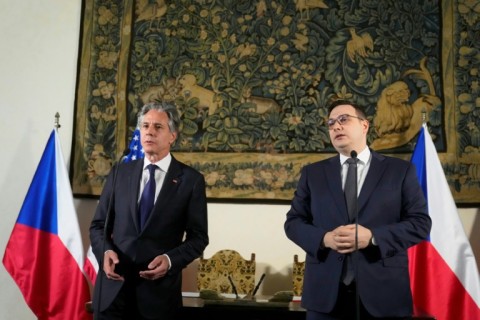NATO chief Jens Stoltenberg pushed at the start of a meeting of the alliance's foreign ministers on Thursday to let Ukraine use Western weapons to strike inside Russia, a move sought by Kyiv but opposed for now by its chief backer Washington.
The two-day meeting in Prague is meant to focus on efforts to hammer out a package of support for Ukraine at NATO's summit in Washington in July.
But the swirling debate over whether to let Kyiv use arms sent by Western backers to strike inside Russia risks overshadowing the talks.
Ukraine has been pressing its supporters, led by the United States, to allow it to use the longer-range weaponry they supply to hit targets on Russian soil.
Some countries including Britain and the Netherlands say Kyiv has the right to use their weapons to strike military targets in Russia.
Norway's Foreign Minister Espen Barth Eide added his support Thursday, telling NRK television that Kyiv should not have to fight "with one hand tied behind its back".
But the United States and Germany have long opposed allowing Kyiv to strike over the border, out of fear it could drag them closer to direct conflict with Moscow.
"The last weeks and months, most of the heavy fighting has taken place actually along the border between Russia and Ukraine," Stoltenberg said ahead of the opening dinner with ministers.

"Therefore I believe that time has come to reconsider some of these restrictions to enable the Ukrainians to really defend themselves."
French President Emmanuel Macron appeared to shift the dial forward on Tuesday when he said Ukraine should be allowed to "neutralise" bases in Russia used to launch strikes.
German Chancellor Olaf Scholz, however, remained less committal, saying Ukraine should act within the law -- and Berlin had not supplied weapons that could hit Russia anyway.
Across the Atlantic, the White House said it still opposed Ukraine using US arms to strike inside Russia, though Secretary of State Antony Blinken hinted that strategy could change.
Russian President Vladimir Putin has warned there would be "serious consequences" if Western countries gave approval to Ukraine.
"NATO member states, the United States, and capitals in Europe in recent days and weeks have been entering a new round of escalations in tensions," Kremlin spokesman Dmitry Peskov said Thursday.
Those pressing for Ukraine to be given a freer rein say they hope momentum is building for Washington and others to change course as Kyiv struggles to stop Russia's offensive in the Kharkiv region.
"I understand the concerns, I understand that there are weapon systems which can be used quite far away," Czech Foreign Minister Jan Lipavsky said.
"But I feel that we are even moving on that in the international sphere."
- 'Firmer footing' -
As NATO allies wrestle with that issue, ministers in Prague are also trying to come up with a support package that keeps Ukraine satisfied as its eventual membership in the alliance remain a distant prospect.
After pressing hard at a summit last year, Kyiv has been told firmly by NATO countries -- led by the United States and Germany -- that it should not expect any concrete progress toward joining the alliance in Washington.
Stoltenberg instead wants to get alliance members to make clear, multi-year commitments on how much aid they'll give to Ukraine in the future.
Last month he floated an overall target figure of 100 billion euros ($108 billion) over five years, but that fell flat among allies confused over what it would involve.
Diplomats say debate is ongoing as allies try to work out what any pledges would cover and how they might be structured.
One area where NATO does seem closer to agreement is a plan for the alliance to take over from the US coordination of weapon supplies to Ukraine.
So far, Washington has been in charge as NATO has stayed clear of involvement in delivering arms due to worries it would incite Russia.
Proponents say making the alliance responsible overall could help insulate future deliveries against a possible return of Donald Trump to the US presidency.
But others fear it might just add more bureaucracy.
"We plan to put our support on a firmer footing, including with a greater NATO role in coordinating security assistance and training, as well as a multi-year financial commitment," Stoltenberg said.
By Max Delany
*The information contained in the article posted represents the views and opinions of the author and does not necessarily represent the views or opinions of eNCA.com

